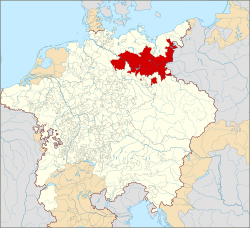March of Brandenburg
| March/Margraviate of Brandenburg | ||||||||||
| Mark/Markgrafschaft Brandenburg | ||||||||||
| State of the Holy Roman Empire Imperial elector (1356–1806) |
||||||||||
|
||||||||||
|
Margraviate of Brandenburg within the Holy Roman Empire (1618)
|
||||||||||
| Capital |
Brandenburg an der Havel Berlin (from 1417) |
|||||||||
| Languages | Low German | |||||||||
| Religion |
Roman Catholic Lutheran Calvinist |
|||||||||
| Government | Monarchy | |||||||||
| Margrave | ||||||||||
| • | 1157–70 | Albert the Bear (first) | ||||||||
| • | 1797–1806 | Frederick William III (last) | ||||||||
| History | ||||||||||
| • | Established | 3 October 1157 | ||||||||
| • | Raised to Electorate | 25 December 1356 | ||||||||
| • | Brandenburg-Prussia | 27 August 1618 | ||||||||
| • | Kingdom of Prussia | 18 January 1701 | ||||||||
| • | Dissolution of the Holy Roman Empire |
6 August 1806 | ||||||||
|
||||||||||
|
History of Brandenburg and Prussia |
|||
|
Northern March pre–12th century |
Old Prussians pre–13th century |
||
|
Margraviate of Brandenburg 1157–1618 (1806) |
Teutonic Order 1224–1525 |
||
|
Duchy of Prussia 1525–1618 |
Royal (Polish) Prussia 1466–1772 |
||
|
Brandenburg-Prussia 1618–1701 |
|||
|
Kingdom in Prussia 1701–1772 |
|||
|
Kingdom of Prussia 1772–1918 |
|||
|
Free State of Prussia 1918–1947 |
Klaipėda Region (Lithuania) 1920–1939 / 1945–present |
||
|
Brandenburg (Germany) 1947–1952 / 1990–present |
Recovered Territories (Poland) 1918/1945–present |
Kaliningrad Oblast (Russia) 1945–present |
|
The Margraviate of Brandenburg (German: Markgrafschaft Brandenburg) was a major principality of the Holy Roman Empire from 1157 to 1806. Also known as the March of Brandenburg (Mark Brandenburg), it played a pivotal role in the history of Germany and Central Europe.
Brandenburg developed out of the Northern March founded in the territory of the Slavic Wends. Its ruling margraves were established as prestigious prince-electors in the Golden Bull of 1356, allowing them to vote in the election of the Holy Roman Emperor. The state thus became additionally known as Electoral Brandenburg or the Electorate of Brandenburg (Kurfürstentum Brandenburg or Kurbrandenburg).
The House of Hohenzollern came to the throne of Brandenburg in 1415. Under Hohenzollern leadership, Brandenburg grew rapidly in power during the 17th century and inherited the Duchy of Prussia. The resulting Brandenburg-Prussia was the predecessor of the Kingdom of Prussia, which became a leading German state during the 18th century. Although the electors' highest title was "King in/of Prussia", their power base remained in Brandenburg and its capital Berlin.
...
Wikipedia




